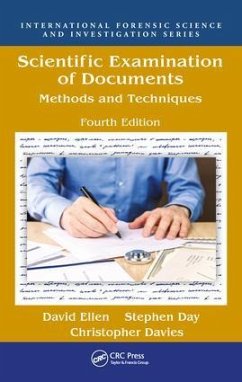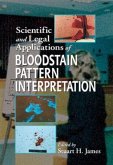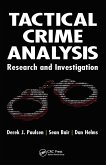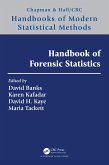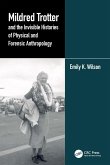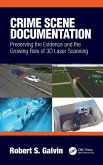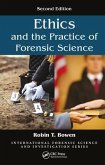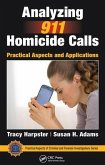David Ellen, Stephen Day, Christopher Davies
Scientific Examination of Documents
Methods and Techniques, Fourth Edition
David Ellen, Stephen Day, Christopher Davies
Scientific Examination of Documents
Methods and Techniques, Fourth Edition
- Gebundenes Buch
- Merkliste
- Auf die Merkliste
- Bewerten Bewerten
- Teilen
- Produkt teilen
- Produkterinnerung
- Produkterinnerung
Revised and expanded to reflect the most recent innovations in the field of forensic document examination, the book explains the various methods used to scrutinize documents in question. Coverage includes the assessment of handwriting techniques, accidental and deliberate modification of handwriting, and the proper collection of samples. It also reviews traditional and modern typewriting technologies, as well as the analysis of photocopies, incidental marks, the functions of photography in document examination, and courtroom applications. New sections address Arabic writing, signature…mehr
Andere Kunden interessierten sich auch für
![Scientific and Legal Applications of Bloodstain Pattern Interpretation Scientific and Legal Applications of Bloodstain Pattern Interpretation]() Stuart H JamesScientific and Legal Applications of Bloodstain Pattern Interpretation178,99 €
Stuart H JamesScientific and Legal Applications of Bloodstain Pattern Interpretation178,99 €![Tactical Crime Analysis Tactical Crime Analysis]() Derek J PaulsenTactical Crime Analysis189,99 €
Derek J PaulsenTactical Crime Analysis189,99 €![Handbook of Forensic Statistics Handbook of Forensic Statistics]() Handbook of Forensic Statistics294,99 €
Handbook of Forensic Statistics294,99 €![Mildred Trotter and the Invisible Histories of Physical and Forensic Anthropology Mildred Trotter and the Invisible Histories of Physical and Forensic Anthropology]() Emily K WilsonMildred Trotter and the Invisible Histories of Physical and Forensic Anthropology189,99 €
Emily K WilsonMildred Trotter and the Invisible Histories of Physical and Forensic Anthropology189,99 €![Crime Scene Documentation Crime Scene Documentation]() Robert S GalvinCrime Scene Documentation82,99 €
Robert S GalvinCrime Scene Documentation82,99 €![Ethics and the Practice of Forensic Science Ethics and the Practice of Forensic Science]() Robin T BowenEthics and the Practice of Forensic Science147,99 €
Robin T BowenEthics and the Practice of Forensic Science147,99 €![Analyzing 911 Homicide Calls Analyzing 911 Homicide Calls]() Tracy HarpsterAnalyzing 911 Homicide Calls165,99 €
Tracy HarpsterAnalyzing 911 Homicide Calls165,99 €-
-
-
Revised and expanded to reflect the most recent innovations in the field of forensic document examination, the book explains the various methods used to scrutinize documents in question. Coverage includes the assessment of handwriting techniques, accidental and deliberate modification of handwriting, and the proper collection of samples. It also reviews traditional and modern typewriting technologies, as well as the analysis of photocopies, incidental marks, the functions of photography in document examination, and courtroom applications. New sections address Arabic writing, signature machines, quality control and quality assurance, current printers and printer technology, and much more.
Produktdetails
- Produktdetails
- Verlag: CRC Press
- 4th edition
- Seitenzahl: 248
- Erscheinungstermin: 8. Mai 2018
- Englisch
- Abmessung: 239mm x 157mm x 20mm
- Gewicht: 540g
- ISBN-13: 9781498768030
- ISBN-10: 1498768032
- Artikelnr.: 51793644
- Verlag: CRC Press
- 4th edition
- Seitenzahl: 248
- Erscheinungstermin: 8. Mai 2018
- Englisch
- Abmessung: 239mm x 157mm x 20mm
- Gewicht: 540g
- ISBN-13: 9781498768030
- ISBN-10: 1498768032
- Artikelnr.: 51793644
Stephen Day has a BSc. and PhD from the University of Bristol. He began his career as a Document Examiner at the Metropolitan Police Forensic Science Laboratory in 1981, transferring to the UK Home Office Forensic Science Service in 1993 to become head of their Questioned Documents team. He has examined thousands of documents and appeared in Court on numerous occasions as an expert witness. He acted as the Lead Scientist for the discipline within the Forensic Science Service between the years of 1999 and 2006, during which time he chaired the European Questioned Documents Working Group for the European Network of Forensic Science Institutes from 2002 to 2004. In 2011 Steve joined the University of East Anglia to become course director for the Forensic and Investigative Chemistry MChem. degree program. This has meant broadening his knowledge in all aspects of forensic science. He still lectures at UEA as a senior lecturer in Forensic Chemistry. David Ellen was in the field of Forensic Science for 43 years. For 29 of these years he specialised in the forensic examination of questioned documents, mostly in the Metropolitan Police Forensic Science Laboratory, London, England, and also in the Forensic Science Centre in Adelaide, South Australia, then in private practice in London. He was secretary of the Questioned Document Section of the meeting of the International Association of Forensic Sciences in Adelaide in 1990 and has trained and inspired a generation of new Document Examiners. He is now retired. Christopher Davies started work in the Metropolitan Police Forensic Science Laboratory in 1981 where he was trained in questioned document examination. He continued to work in London when the Metropolitan Police Laboratory became part of the Forensic Science Service in 1996. He became one of the senior document examiners responsible for dealing with serious crime, including counter-terrorism, cases. In 2010 he left the London Laboratory when the Questioned Documents Section there was closed and continues to work as an independent consultant. He is also the ISO/IEC 17025 technical assessor for questioned documents for the United Kingdom Accreditation Service.
Preface xiii
Acknowledgments xv
Authors xvii
1 Introduction 1
Scientific Method 1
Analytical Methods 1
Documents 3
Document Examiners 5
Qualifications and Training 6
Objects of This Book 7
Literature on Document Examination 8
Books 8
Journals 8
Research and Development 9
References 10
2 Handwriting: The Variations between Normal
Writings 11
Introduction 11
Variations in Writing 12
Block Capital Writing 12
Methods of Construction 13
Determination of Pen Movement 15
Ink Lines 16
Striations 16
Proportion of Letters 16
Proportions of Letters within Words 18
Numerals 18
Cursive Writing 19
Development of Cursive Writing 19
Interpersonal Differences 20
K29222_Book.indb 5 4/7/2018 4:06:39 PM
vi Contents
Methods of Construction and Proportion of Individual
Letters 20
Variations within Words 22
Disconnected Script 22
Signatures 22
Layout 23
Variations within the Writings of One Person 24
Use of Different Letter Forms by One Writer 25
Personal and Style Characteristics 25
The Significance of Variations between Writers 25
Spelling Mistakes, Text Analysis, and Other Variables 27
Non-Roman Scripts 28
Classification of Handwritings 29
Pattern Recognition Techniques 29
References 30
Further Reading 31
3 Handwriting: Accidental and Deliberate
Modification 35
Introduction 35
Accidental Variation of Handwriting 35
Writing Instruments 35
Writing Position 37
Health of Writer 38
Guided Hand Signatures 39
Drugs and Alcohol 39
Impairment of Vision 40
Deliberate Variation of Handwriting 40
Disguised Writings 41
Difficulties of Disguising Writing 42
Disguised Signatures 43
Simulated Writings 44
Freehand Simulation 44
Slowly Made Simulations 45
Simulations of Poorly Made Signatures 46
Coincidental Matches and Signatures 46
Rapidly Made Simulations 47
Traced Signatures 47
Introduction of Features of the Copier 50
References 51
Further Reading 51
K29222_Book.indb 6 4/7/2018 4:06:39 PM
Contents vii
4 Handwriting: The Purposes and Principles of
Scientific Examination 53
Introduction 53
Amateur Experts 53
Scientific Method 54
Other Aspects of Forensic Science 55
Comparison of Handwriting 56
Consideration of Similarities 56
The Possibility of Chance Match 57
The Possibility of Simulation 57
Subjectivity 58
Common Authorship 59
Qualified Conclusions 59
Limited Populations 60
Consideration of Differences 60
Consistent Differences 61
Other Reasons for Differences 62
Similarities with Differences 63
Disguise 63
Simulation 64
Simulations or Ill Health 65
Traced Writings 66
Identification of the Writer of
Simulations 67
Inconclusive Examinations 68
Complexities of Handwriting Comparisons 68
Inconsistent Known Writings 68
Complex Cases 69
Multiple Suspects 70
Reproduced Writing 70
Unfamiliar Scripts 71
Statements 73
Expressing Conclusions 73
Qualified Conclusions 74
Scales of Conclusions 75
Clarity of Expression 76
Quality 77
References 78
Further Reading 79
K29222_Book.indb 7 4/7/2018 4:06:39 PM
viii Contents
5 Handwriting: The Collection of Samples 83
Introduction 83
Known Writings 83
Request Specimens 83
Like with Like 84
Adequate Material 84
Taking of Samples 85
Avoidance of Disguise 86
Samples of Writing of the Target Writer 87
Course of Business Writings 87
Sources 88
Signatures 88
Verification of Course-of-Business Writings 89
Request and Course-of-Business Writings 89
Further Reading 90
6 Typewriting and Typescripts 91
Introduction 91
Typewriting 91
Typeface 92
Letter Spacing 93
Typeface Collections 93
Linking Typewriting to a Machine 94
Typewriter Faults 95
Other Faults 96
Comparison of Typescript 97
Methods 97
Comparison of Images 98
The Significance of Differences 98
The Significance of Similarities 99
Dating of Typewritings 100
The Collection of Samples 100
Connecting Factors Other Than Typescript 102
Ribbon Composition 104
Erasure of Typewriting 104
Other Examinations of Typewritten Documents 105
Dating of Typewritten Documents 105
Added Typescript 106
Identification of a Typist 106
References 108
Further Reading 108
K29222_Book.indb 8 4/7/2018 4:06:39 PM
Contents ix
7 The Materials of Handwritten Documents:
Substances and Techniques 111
Introduction 111
Light 112
Examination of Color 112
Absorbance 113
Spectroscopy Techniques 113
Luminescence 115
Paper 116
Manufacture of Paper 117
Testing of Paper 117
Nondestructive Tests 118
Visual Comparison 118
Absorbance 119
Luminescence 119
Destructive Tests 120
Comparison of Paper 122
Mechanical Fits 122
Watermarks 123
Dating of Paper 124
Envelopes 125
Writing Materials 125
Pencils 126
Inks 126
Liquid Inks 127
Ballpoint Inks 127
Fiber-Tipped, Rollerball, and Gel Pens 127
The Examination of Inks 128
Visual Examination 129
The Examination of Inks Using Filtered Light
Techniques-Absorbance 130
Detection of Infrared Radiation 132
Infrared Absorption 132
Ultraviolet and Visible Light Luminescence 134
Infrared Luminescence 135
Comparison of Inks Using Infrared Luminescence 136
Erasures 138
Obliterations 139
Other Luminescence Effects 140
Destructive Techniques 141
Sampling 141
K29222_Book.indb 9 4/7/2018 4:06:39 PM
x Contents
Chemical Tests 142
Chromatography 143
Thin-Layer Chromatography 143
High-Performance Liquid Chromatography 145
Other Components of Ink 145
Further Techniques 146
Relative Aging of Ballpoint Inks 146
Dating of Inks 147
References 147
Further Reading 149
8 The Examination of Printed and Photocopied
Documents 153
Introduction 153
Traditional Printing Methods 154
Letterpress Printing 154
Lithography 154
Gravure 155
Raised Printing 156
Screen Printing 156
Identification of Printing Methods 157
Letterpress 157
Lithography 157
Gravure 158
Printing Inks 158
Methods of Examination 158
Identification of the Source of Printed Material 159
Office Printing 160
Nonimpact Printing Methods 162
Inkjet Printers 162
Ink Delivery 163
Inks 164
Examination of Inkjet Printers 165
Electrostatic Printers: Laser Printers and Photocopiers 166
Photocopying 166
Electrostatic Printing (Xerography) 166
Laser Printing 167
The Examination of Photocopies 167
Photocopy Toners 167
Machine Characteristics 168
Linking a Photocopy with a Photocopier 169
The Identification of the Origins of a Photocopy 170
K29222_Book.indb 10 4/7/2018 4:06:39 PM
Contents xi
Facsimile Machines 171
Fraudulent Photocopies 172
Other Printing Methods 173
Dot-Matrix Machines 174
Stamped Impressions 175
Rubber Stamps 176
Printing Sets 177
Stamp-Pad Inks 178
Dry Transfer Methods 178
Miscellaneous Machine Printers 179
References 180
Further Reading 181
9 Incidental Marks and Other Scientific
Examinations 185
Introduction 185
Indented Impressions 185
Detection of Indentation Impressions 186
Oblique Lighting 186
Shading 186
Electrostatic Detection 186
Secondary Impressions 190
Fingerprints and DNA on Documents 191
Damage to Documents 192
Folds and Creases 192
Staples and Paper clips 192
Deliberate Damage 194
Charred Documents 194
Matted Documents 195
Shredded Documents 195
Erasures and Obliterations 196
Altered Envelopes 197
The Examination of Adhesives 199
The Examination of Passports 199
Crossed Lines and Sequencing of Writings 201
Liquid Ink Sequencing 201
Ballpoint Inks 202
Offset Marks 203
Pencil Lines 204
Wax Crayon Lines 204
Sequencing of Indented Impressions and Writings 204
Sequencing of Office Printing 206
K29222_Book.indb 11 4/7/2018 4:06:39 PM
xii Contents
References 206
Further Reading 207
10 The Functions of Imaging in Document
Examination and Other Special Techniques 211
Imaging 211
Record Imaging 211
Recording Invisible Radiations 212
The Use of Filters 213
Imaging for Demonstration Charts 214
Examination of Photographs as Questioned Documents 215
Live Viewing Techniques 216
Processing 217
Optical Microscopes 218
Comparison Microscopes 219
Scanning Electron Microscopy 219
Further Reading 221
11 Document Examination in Court 223
Introduction 223
The Conduct of the Witness 223
Dress 224
Manner of Giving Evidence 224
Technical Evidence 224
The Role of Counsel 225
Conferences 225
Cross-Examination 225
Further Examinations 227
Opposing Experts 228
Incompetent Examiners 229
Presentation of Handwriting Evidence 229
Demonstration Charts 230
Evidence Other Than Handwriting 232
Special Photography 232
Differences in Inks 233
Indented Impressions 233
Mechanical Fits 234
Further Reading 234
Index 237
Acknowledgments xv
Authors xvii
1 Introduction 1
Scientific Method 1
Analytical Methods 1
Documents 3
Document Examiners 5
Qualifications and Training 6
Objects of This Book 7
Literature on Document Examination 8
Books 8
Journals 8
Research and Development 9
References 10
2 Handwriting: The Variations between Normal
Writings 11
Introduction 11
Variations in Writing 12
Block Capital Writing 12
Methods of Construction 13
Determination of Pen Movement 15
Ink Lines 16
Striations 16
Proportion of Letters 16
Proportions of Letters within Words 18
Numerals 18
Cursive Writing 19
Development of Cursive Writing 19
Interpersonal Differences 20
K29222_Book.indb 5 4/7/2018 4:06:39 PM
vi Contents
Methods of Construction and Proportion of Individual
Letters 20
Variations within Words 22
Disconnected Script 22
Signatures 22
Layout 23
Variations within the Writings of One Person 24
Use of Different Letter Forms by One Writer 25
Personal and Style Characteristics 25
The Significance of Variations between Writers 25
Spelling Mistakes, Text Analysis, and Other Variables 27
Non-Roman Scripts 28
Classification of Handwritings 29
Pattern Recognition Techniques 29
References 30
Further Reading 31
3 Handwriting: Accidental and Deliberate
Modification 35
Introduction 35
Accidental Variation of Handwriting 35
Writing Instruments 35
Writing Position 37
Health of Writer 38
Guided Hand Signatures 39
Drugs and Alcohol 39
Impairment of Vision 40
Deliberate Variation of Handwriting 40
Disguised Writings 41
Difficulties of Disguising Writing 42
Disguised Signatures 43
Simulated Writings 44
Freehand Simulation 44
Slowly Made Simulations 45
Simulations of Poorly Made Signatures 46
Coincidental Matches and Signatures 46
Rapidly Made Simulations 47
Traced Signatures 47
Introduction of Features of the Copier 50
References 51
Further Reading 51
K29222_Book.indb 6 4/7/2018 4:06:39 PM
Contents vii
4 Handwriting: The Purposes and Principles of
Scientific Examination 53
Introduction 53
Amateur Experts 53
Scientific Method 54
Other Aspects of Forensic Science 55
Comparison of Handwriting 56
Consideration of Similarities 56
The Possibility of Chance Match 57
The Possibility of Simulation 57
Subjectivity 58
Common Authorship 59
Qualified Conclusions 59
Limited Populations 60
Consideration of Differences 60
Consistent Differences 61
Other Reasons for Differences 62
Similarities with Differences 63
Disguise 63
Simulation 64
Simulations or Ill Health 65
Traced Writings 66
Identification of the Writer of
Simulations 67
Inconclusive Examinations 68
Complexities of Handwriting Comparisons 68
Inconsistent Known Writings 68
Complex Cases 69
Multiple Suspects 70
Reproduced Writing 70
Unfamiliar Scripts 71
Statements 73
Expressing Conclusions 73
Qualified Conclusions 74
Scales of Conclusions 75
Clarity of Expression 76
Quality 77
References 78
Further Reading 79
K29222_Book.indb 7 4/7/2018 4:06:39 PM
viii Contents
5 Handwriting: The Collection of Samples 83
Introduction 83
Known Writings 83
Request Specimens 83
Like with Like 84
Adequate Material 84
Taking of Samples 85
Avoidance of Disguise 86
Samples of Writing of the Target Writer 87
Course of Business Writings 87
Sources 88
Signatures 88
Verification of Course-of-Business Writings 89
Request and Course-of-Business Writings 89
Further Reading 90
6 Typewriting and Typescripts 91
Introduction 91
Typewriting 91
Typeface 92
Letter Spacing 93
Typeface Collections 93
Linking Typewriting to a Machine 94
Typewriter Faults 95
Other Faults 96
Comparison of Typescript 97
Methods 97
Comparison of Images 98
The Significance of Differences 98
The Significance of Similarities 99
Dating of Typewritings 100
The Collection of Samples 100
Connecting Factors Other Than Typescript 102
Ribbon Composition 104
Erasure of Typewriting 104
Other Examinations of Typewritten Documents 105
Dating of Typewritten Documents 105
Added Typescript 106
Identification of a Typist 106
References 108
Further Reading 108
K29222_Book.indb 8 4/7/2018 4:06:39 PM
Contents ix
7 The Materials of Handwritten Documents:
Substances and Techniques 111
Introduction 111
Light 112
Examination of Color 112
Absorbance 113
Spectroscopy Techniques 113
Luminescence 115
Paper 116
Manufacture of Paper 117
Testing of Paper 117
Nondestructive Tests 118
Visual Comparison 118
Absorbance 119
Luminescence 119
Destructive Tests 120
Comparison of Paper 122
Mechanical Fits 122
Watermarks 123
Dating of Paper 124
Envelopes 125
Writing Materials 125
Pencils 126
Inks 126
Liquid Inks 127
Ballpoint Inks 127
Fiber-Tipped, Rollerball, and Gel Pens 127
The Examination of Inks 128
Visual Examination 129
The Examination of Inks Using Filtered Light
Techniques-Absorbance 130
Detection of Infrared Radiation 132
Infrared Absorption 132
Ultraviolet and Visible Light Luminescence 134
Infrared Luminescence 135
Comparison of Inks Using Infrared Luminescence 136
Erasures 138
Obliterations 139
Other Luminescence Effects 140
Destructive Techniques 141
Sampling 141
K29222_Book.indb 9 4/7/2018 4:06:39 PM
x Contents
Chemical Tests 142
Chromatography 143
Thin-Layer Chromatography 143
High-Performance Liquid Chromatography 145
Other Components of Ink 145
Further Techniques 146
Relative Aging of Ballpoint Inks 146
Dating of Inks 147
References 147
Further Reading 149
8 The Examination of Printed and Photocopied
Documents 153
Introduction 153
Traditional Printing Methods 154
Letterpress Printing 154
Lithography 154
Gravure 155
Raised Printing 156
Screen Printing 156
Identification of Printing Methods 157
Letterpress 157
Lithography 157
Gravure 158
Printing Inks 158
Methods of Examination 158
Identification of the Source of Printed Material 159
Office Printing 160
Nonimpact Printing Methods 162
Inkjet Printers 162
Ink Delivery 163
Inks 164
Examination of Inkjet Printers 165
Electrostatic Printers: Laser Printers and Photocopiers 166
Photocopying 166
Electrostatic Printing (Xerography) 166
Laser Printing 167
The Examination of Photocopies 167
Photocopy Toners 167
Machine Characteristics 168
Linking a Photocopy with a Photocopier 169
The Identification of the Origins of a Photocopy 170
K29222_Book.indb 10 4/7/2018 4:06:39 PM
Contents xi
Facsimile Machines 171
Fraudulent Photocopies 172
Other Printing Methods 173
Dot-Matrix Machines 174
Stamped Impressions 175
Rubber Stamps 176
Printing Sets 177
Stamp-Pad Inks 178
Dry Transfer Methods 178
Miscellaneous Machine Printers 179
References 180
Further Reading 181
9 Incidental Marks and Other Scientific
Examinations 185
Introduction 185
Indented Impressions 185
Detection of Indentation Impressions 186
Oblique Lighting 186
Shading 186
Electrostatic Detection 186
Secondary Impressions 190
Fingerprints and DNA on Documents 191
Damage to Documents 192
Folds and Creases 192
Staples and Paper clips 192
Deliberate Damage 194
Charred Documents 194
Matted Documents 195
Shredded Documents 195
Erasures and Obliterations 196
Altered Envelopes 197
The Examination of Adhesives 199
The Examination of Passports 199
Crossed Lines and Sequencing of Writings 201
Liquid Ink Sequencing 201
Ballpoint Inks 202
Offset Marks 203
Pencil Lines 204
Wax Crayon Lines 204
Sequencing of Indented Impressions and Writings 204
Sequencing of Office Printing 206
K29222_Book.indb 11 4/7/2018 4:06:39 PM
xii Contents
References 206
Further Reading 207
10 The Functions of Imaging in Document
Examination and Other Special Techniques 211
Imaging 211
Record Imaging 211
Recording Invisible Radiations 212
The Use of Filters 213
Imaging for Demonstration Charts 214
Examination of Photographs as Questioned Documents 215
Live Viewing Techniques 216
Processing 217
Optical Microscopes 218
Comparison Microscopes 219
Scanning Electron Microscopy 219
Further Reading 221
11 Document Examination in Court 223
Introduction 223
The Conduct of the Witness 223
Dress 224
Manner of Giving Evidence 224
Technical Evidence 224
The Role of Counsel 225
Conferences 225
Cross-Examination 225
Further Examinations 227
Opposing Experts 228
Incompetent Examiners 229
Presentation of Handwriting Evidence 229
Demonstration Charts 230
Evidence Other Than Handwriting 232
Special Photography 232
Differences in Inks 233
Indented Impressions 233
Mechanical Fits 234
Further Reading 234
Index 237
Preface xiii
Acknowledgments xv
Authors xvii
1 Introduction 1
Scientific Method 1
Analytical Methods 1
Documents 3
Document Examiners 5
Qualifications and Training 6
Objects of This Book 7
Literature on Document Examination 8
Books 8
Journals 8
Research and Development 9
References 10
2 Handwriting: The Variations between Normal
Writings 11
Introduction 11
Variations in Writing 12
Block Capital Writing 12
Methods of Construction 13
Determination of Pen Movement 15
Ink Lines 16
Striations 16
Proportion of Letters 16
Proportions of Letters within Words 18
Numerals 18
Cursive Writing 19
Development of Cursive Writing 19
Interpersonal Differences 20
K29222_Book.indb 5 4/7/2018 4:06:39 PM
vi Contents
Methods of Construction and Proportion of Individual
Letters 20
Variations within Words 22
Disconnected Script 22
Signatures 22
Layout 23
Variations within the Writings of One Person 24
Use of Different Letter Forms by One Writer 25
Personal and Style Characteristics 25
The Significance of Variations between Writers 25
Spelling Mistakes, Text Analysis, and Other Variables 27
Non-Roman Scripts 28
Classification of Handwritings 29
Pattern Recognition Techniques 29
References 30
Further Reading 31
3 Handwriting: Accidental and Deliberate
Modification 35
Introduction 35
Accidental Variation of Handwriting 35
Writing Instruments 35
Writing Position 37
Health of Writer 38
Guided Hand Signatures 39
Drugs and Alcohol 39
Impairment of Vision 40
Deliberate Variation of Handwriting 40
Disguised Writings 41
Difficulties of Disguising Writing 42
Disguised Signatures 43
Simulated Writings 44
Freehand Simulation 44
Slowly Made Simulations 45
Simulations of Poorly Made Signatures 46
Coincidental Matches and Signatures 46
Rapidly Made Simulations 47
Traced Signatures 47
Introduction of Features of the Copier 50
References 51
Further Reading 51
K29222_Book.indb 6 4/7/2018 4:06:39 PM
Contents vii
4 Handwriting: The Purposes and Principles of
Scientific Examination 53
Introduction 53
Amateur Experts 53
Scientific Method 54
Other Aspects of Forensic Science 55
Comparison of Handwriting 56
Consideration of Similarities 56
The Possibility of Chance Match 57
The Possibility of Simulation 57
Subjectivity 58
Common Authorship 59
Qualified Conclusions 59
Limited Populations 60
Consideration of Differences 60
Consistent Differences 61
Other Reasons for Differences 62
Similarities with Differences 63
Disguise 63
Simulation 64
Simulations or Ill Health 65
Traced Writings 66
Identification of the Writer of
Simulations 67
Inconclusive Examinations 68
Complexities of Handwriting Comparisons 68
Inconsistent Known Writings 68
Complex Cases 69
Multiple Suspects 70
Reproduced Writing 70
Unfamiliar Scripts 71
Statements 73
Expressing Conclusions 73
Qualified Conclusions 74
Scales of Conclusions 75
Clarity of Expression 76
Quality 77
References 78
Further Reading 79
K29222_Book.indb 7 4/7/2018 4:06:39 PM
viii Contents
5 Handwriting: The Collection of Samples 83
Introduction 83
Known Writings 83
Request Specimens 83
Like with Like 84
Adequate Material 84
Taking of Samples 85
Avoidance of Disguise 86
Samples of Writing of the Target Writer 87
Course of Business Writings 87
Sources 88
Signatures 88
Verification of Course-of-Business Writings 89
Request and Course-of-Business Writings 89
Further Reading 90
6 Typewriting and Typescripts 91
Introduction 91
Typewriting 91
Typeface 92
Letter Spacing 93
Typeface Collections 93
Linking Typewriting to a Machine 94
Typewriter Faults 95
Other Faults 96
Comparison of Typescript 97
Methods 97
Comparison of Images 98
The Significance of Differences 98
The Significance of Similarities 99
Dating of Typewritings 100
The Collection of Samples 100
Connecting Factors Other Than Typescript 102
Ribbon Composition 104
Erasure of Typewriting 104
Other Examinations of Typewritten Documents 105
Dating of Typewritten Documents 105
Added Typescript 106
Identification of a Typist 106
References 108
Further Reading 108
K29222_Book.indb 8 4/7/2018 4:06:39 PM
Contents ix
7 The Materials of Handwritten Documents:
Substances and Techniques 111
Introduction 111
Light 112
Examination of Color 112
Absorbance 113
Spectroscopy Techniques 113
Luminescence 115
Paper 116
Manufacture of Paper 117
Testing of Paper 117
Nondestructive Tests 118
Visual Comparison 118
Absorbance 119
Luminescence 119
Destructive Tests 120
Comparison of Paper 122
Mechanical Fits 122
Watermarks 123
Dating of Paper 124
Envelopes 125
Writing Materials 125
Pencils 126
Inks 126
Liquid Inks 127
Ballpoint Inks 127
Fiber-Tipped, Rollerball, and Gel Pens 127
The Examination of Inks 128
Visual Examination 129
The Examination of Inks Using Filtered Light
Techniques-Absorbance 130
Detection of Infrared Radiation 132
Infrared Absorption 132
Ultraviolet and Visible Light Luminescence 134
Infrared Luminescence 135
Comparison of Inks Using Infrared Luminescence 136
Erasures 138
Obliterations 139
Other Luminescence Effects 140
Destructive Techniques 141
Sampling 141
K29222_Book.indb 9 4/7/2018 4:06:39 PM
x Contents
Chemical Tests 142
Chromatography 143
Thin-Layer Chromatography 143
High-Performance Liquid Chromatography 145
Other Components of Ink 145
Further Techniques 146
Relative Aging of Ballpoint Inks 146
Dating of Inks 147
References 147
Further Reading 149
8 The Examination of Printed and Photocopied
Documents 153
Introduction 153
Traditional Printing Methods 154
Letterpress Printing 154
Lithography 154
Gravure 155
Raised Printing 156
Screen Printing 156
Identification of Printing Methods 157
Letterpress 157
Lithography 157
Gravure 158
Printing Inks 158
Methods of Examination 158
Identification of the Source of Printed Material 159
Office Printing 160
Nonimpact Printing Methods 162
Inkjet Printers 162
Ink Delivery 163
Inks 164
Examination of Inkjet Printers 165
Electrostatic Printers: Laser Printers and Photocopiers 166
Photocopying 166
Electrostatic Printing (Xerography) 166
Laser Printing 167
The Examination of Photocopies 167
Photocopy Toners 167
Machine Characteristics 168
Linking a Photocopy with a Photocopier 169
The Identification of the Origins of a Photocopy 170
K29222_Book.indb 10 4/7/2018 4:06:39 PM
Contents xi
Facsimile Machines 171
Fraudulent Photocopies 172
Other Printing Methods 173
Dot-Matrix Machines 174
Stamped Impressions 175
Rubber Stamps 176
Printing Sets 177
Stamp-Pad Inks 178
Dry Transfer Methods 178
Miscellaneous Machine Printers 179
References 180
Further Reading 181
9 Incidental Marks and Other Scientific
Examinations 185
Introduction 185
Indented Impressions 185
Detection of Indentation Impressions 186
Oblique Lighting 186
Shading 186
Electrostatic Detection 186
Secondary Impressions 190
Fingerprints and DNA on Documents 191
Damage to Documents 192
Folds and Creases 192
Staples and Paper clips 192
Deliberate Damage 194
Charred Documents 194
Matted Documents 195
Shredded Documents 195
Erasures and Obliterations 196
Altered Envelopes 197
The Examination of Adhesives 199
The Examination of Passports 199
Crossed Lines and Sequencing of Writings 201
Liquid Ink Sequencing 201
Ballpoint Inks 202
Offset Marks 203
Pencil Lines 204
Wax Crayon Lines 204
Sequencing of Indented Impressions and Writings 204
Sequencing of Office Printing 206
K29222_Book.indb 11 4/7/2018 4:06:39 PM
xii Contents
References 206
Further Reading 207
10 The Functions of Imaging in Document
Examination and Other Special Techniques 211
Imaging 211
Record Imaging 211
Recording Invisible Radiations 212
The Use of Filters 213
Imaging for Demonstration Charts 214
Examination of Photographs as Questioned Documents 215
Live Viewing Techniques 216
Processing 217
Optical Microscopes 218
Comparison Microscopes 219
Scanning Electron Microscopy 219
Further Reading 221
11 Document Examination in Court 223
Introduction 223
The Conduct of the Witness 223
Dress 224
Manner of Giving Evidence 224
Technical Evidence 224
The Role of Counsel 225
Conferences 225
Cross-Examination 225
Further Examinations 227
Opposing Experts 228
Incompetent Examiners 229
Presentation of Handwriting Evidence 229
Demonstration Charts 230
Evidence Other Than Handwriting 232
Special Photography 232
Differences in Inks 233
Indented Impressions 233
Mechanical Fits 234
Further Reading 234
Index 237
Acknowledgments xv
Authors xvii
1 Introduction 1
Scientific Method 1
Analytical Methods 1
Documents 3
Document Examiners 5
Qualifications and Training 6
Objects of This Book 7
Literature on Document Examination 8
Books 8
Journals 8
Research and Development 9
References 10
2 Handwriting: The Variations between Normal
Writings 11
Introduction 11
Variations in Writing 12
Block Capital Writing 12
Methods of Construction 13
Determination of Pen Movement 15
Ink Lines 16
Striations 16
Proportion of Letters 16
Proportions of Letters within Words 18
Numerals 18
Cursive Writing 19
Development of Cursive Writing 19
Interpersonal Differences 20
K29222_Book.indb 5 4/7/2018 4:06:39 PM
vi Contents
Methods of Construction and Proportion of Individual
Letters 20
Variations within Words 22
Disconnected Script 22
Signatures 22
Layout 23
Variations within the Writings of One Person 24
Use of Different Letter Forms by One Writer 25
Personal and Style Characteristics 25
The Significance of Variations between Writers 25
Spelling Mistakes, Text Analysis, and Other Variables 27
Non-Roman Scripts 28
Classification of Handwritings 29
Pattern Recognition Techniques 29
References 30
Further Reading 31
3 Handwriting: Accidental and Deliberate
Modification 35
Introduction 35
Accidental Variation of Handwriting 35
Writing Instruments 35
Writing Position 37
Health of Writer 38
Guided Hand Signatures 39
Drugs and Alcohol 39
Impairment of Vision 40
Deliberate Variation of Handwriting 40
Disguised Writings 41
Difficulties of Disguising Writing 42
Disguised Signatures 43
Simulated Writings 44
Freehand Simulation 44
Slowly Made Simulations 45
Simulations of Poorly Made Signatures 46
Coincidental Matches and Signatures 46
Rapidly Made Simulations 47
Traced Signatures 47
Introduction of Features of the Copier 50
References 51
Further Reading 51
K29222_Book.indb 6 4/7/2018 4:06:39 PM
Contents vii
4 Handwriting: The Purposes and Principles of
Scientific Examination 53
Introduction 53
Amateur Experts 53
Scientific Method 54
Other Aspects of Forensic Science 55
Comparison of Handwriting 56
Consideration of Similarities 56
The Possibility of Chance Match 57
The Possibility of Simulation 57
Subjectivity 58
Common Authorship 59
Qualified Conclusions 59
Limited Populations 60
Consideration of Differences 60
Consistent Differences 61
Other Reasons for Differences 62
Similarities with Differences 63
Disguise 63
Simulation 64
Simulations or Ill Health 65
Traced Writings 66
Identification of the Writer of
Simulations 67
Inconclusive Examinations 68
Complexities of Handwriting Comparisons 68
Inconsistent Known Writings 68
Complex Cases 69
Multiple Suspects 70
Reproduced Writing 70
Unfamiliar Scripts 71
Statements 73
Expressing Conclusions 73
Qualified Conclusions 74
Scales of Conclusions 75
Clarity of Expression 76
Quality 77
References 78
Further Reading 79
K29222_Book.indb 7 4/7/2018 4:06:39 PM
viii Contents
5 Handwriting: The Collection of Samples 83
Introduction 83
Known Writings 83
Request Specimens 83
Like with Like 84
Adequate Material 84
Taking of Samples 85
Avoidance of Disguise 86
Samples of Writing of the Target Writer 87
Course of Business Writings 87
Sources 88
Signatures 88
Verification of Course-of-Business Writings 89
Request and Course-of-Business Writings 89
Further Reading 90
6 Typewriting and Typescripts 91
Introduction 91
Typewriting 91
Typeface 92
Letter Spacing 93
Typeface Collections 93
Linking Typewriting to a Machine 94
Typewriter Faults 95
Other Faults 96
Comparison of Typescript 97
Methods 97
Comparison of Images 98
The Significance of Differences 98
The Significance of Similarities 99
Dating of Typewritings 100
The Collection of Samples 100
Connecting Factors Other Than Typescript 102
Ribbon Composition 104
Erasure of Typewriting 104
Other Examinations of Typewritten Documents 105
Dating of Typewritten Documents 105
Added Typescript 106
Identification of a Typist 106
References 108
Further Reading 108
K29222_Book.indb 8 4/7/2018 4:06:39 PM
Contents ix
7 The Materials of Handwritten Documents:
Substances and Techniques 111
Introduction 111
Light 112
Examination of Color 112
Absorbance 113
Spectroscopy Techniques 113
Luminescence 115
Paper 116
Manufacture of Paper 117
Testing of Paper 117
Nondestructive Tests 118
Visual Comparison 118
Absorbance 119
Luminescence 119
Destructive Tests 120
Comparison of Paper 122
Mechanical Fits 122
Watermarks 123
Dating of Paper 124
Envelopes 125
Writing Materials 125
Pencils 126
Inks 126
Liquid Inks 127
Ballpoint Inks 127
Fiber-Tipped, Rollerball, and Gel Pens 127
The Examination of Inks 128
Visual Examination 129
The Examination of Inks Using Filtered Light
Techniques-Absorbance 130
Detection of Infrared Radiation 132
Infrared Absorption 132
Ultraviolet and Visible Light Luminescence 134
Infrared Luminescence 135
Comparison of Inks Using Infrared Luminescence 136
Erasures 138
Obliterations 139
Other Luminescence Effects 140
Destructive Techniques 141
Sampling 141
K29222_Book.indb 9 4/7/2018 4:06:39 PM
x Contents
Chemical Tests 142
Chromatography 143
Thin-Layer Chromatography 143
High-Performance Liquid Chromatography 145
Other Components of Ink 145
Further Techniques 146
Relative Aging of Ballpoint Inks 146
Dating of Inks 147
References 147
Further Reading 149
8 The Examination of Printed and Photocopied
Documents 153
Introduction 153
Traditional Printing Methods 154
Letterpress Printing 154
Lithography 154
Gravure 155
Raised Printing 156
Screen Printing 156
Identification of Printing Methods 157
Letterpress 157
Lithography 157
Gravure 158
Printing Inks 158
Methods of Examination 158
Identification of the Source of Printed Material 159
Office Printing 160
Nonimpact Printing Methods 162
Inkjet Printers 162
Ink Delivery 163
Inks 164
Examination of Inkjet Printers 165
Electrostatic Printers: Laser Printers and Photocopiers 166
Photocopying 166
Electrostatic Printing (Xerography) 166
Laser Printing 167
The Examination of Photocopies 167
Photocopy Toners 167
Machine Characteristics 168
Linking a Photocopy with a Photocopier 169
The Identification of the Origins of a Photocopy 170
K29222_Book.indb 10 4/7/2018 4:06:39 PM
Contents xi
Facsimile Machines 171
Fraudulent Photocopies 172
Other Printing Methods 173
Dot-Matrix Machines 174
Stamped Impressions 175
Rubber Stamps 176
Printing Sets 177
Stamp-Pad Inks 178
Dry Transfer Methods 178
Miscellaneous Machine Printers 179
References 180
Further Reading 181
9 Incidental Marks and Other Scientific
Examinations 185
Introduction 185
Indented Impressions 185
Detection of Indentation Impressions 186
Oblique Lighting 186
Shading 186
Electrostatic Detection 186
Secondary Impressions 190
Fingerprints and DNA on Documents 191
Damage to Documents 192
Folds and Creases 192
Staples and Paper clips 192
Deliberate Damage 194
Charred Documents 194
Matted Documents 195
Shredded Documents 195
Erasures and Obliterations 196
Altered Envelopes 197
The Examination of Adhesives 199
The Examination of Passports 199
Crossed Lines and Sequencing of Writings 201
Liquid Ink Sequencing 201
Ballpoint Inks 202
Offset Marks 203
Pencil Lines 204
Wax Crayon Lines 204
Sequencing of Indented Impressions and Writings 204
Sequencing of Office Printing 206
K29222_Book.indb 11 4/7/2018 4:06:39 PM
xii Contents
References 206
Further Reading 207
10 The Functions of Imaging in Document
Examination and Other Special Techniques 211
Imaging 211
Record Imaging 211
Recording Invisible Radiations 212
The Use of Filters 213
Imaging for Demonstration Charts 214
Examination of Photographs as Questioned Documents 215
Live Viewing Techniques 216
Processing 217
Optical Microscopes 218
Comparison Microscopes 219
Scanning Electron Microscopy 219
Further Reading 221
11 Document Examination in Court 223
Introduction 223
The Conduct of the Witness 223
Dress 224
Manner of Giving Evidence 224
Technical Evidence 224
The Role of Counsel 225
Conferences 225
Cross-Examination 225
Further Examinations 227
Opposing Experts 228
Incompetent Examiners 229
Presentation of Handwriting Evidence 229
Demonstration Charts 230
Evidence Other Than Handwriting 232
Special Photography 232
Differences in Inks 233
Indented Impressions 233
Mechanical Fits 234
Further Reading 234
Index 237

